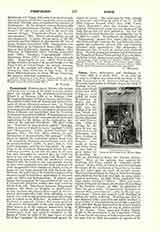

Ponce, JOHN, philosopher and theologian, b. at Cork, 1603, d. at Paris, 1670. At an early age he went to Belgium and entered the novitiate of the Irish Franciscans in St. Antony’s College, Louvain. He studied philosophy at Cologne, began the study of theology in Louvain, under Hugh Ward and John Colgan, was called by Luke Wadding to Rome, and admitted September 7, 1625, into the College of St. Isidore which had just been founded for the education of Irish Francis-cans. After receiving his degrees he was appointed to teach philosophy and, later, theology in St. Isidore’s. He lectured afterwards at Lyons and Paris, where he was held in great repute for Fresco in the College of St. Isidore, Rome his learning. In 1643 he published in Rome his “Cursus philosophiae”. Some of his opinions were opposed by Mastrius, and Ponce replied in “Appendix apologeticus” (Rome, 1645), in which he says that although he accepts all the conclusions of Duns Scotus, he does not feel called upon to adopt all Scotus’s proofs. Mastrius acknowledged the force of Ponce’s reasoning and admitted that he had shed light on many philosophical problems. In 1652, Ponce published “Integer cursus theologise” (Paris). These two works explain with great clearness and precision the teaching of the Scotistic school. In 1661, he published at Paris his great work, “Commentarii theologici in quatuor libros sententiarum”, called by Hurter opus rarissimum. Ponce also assisted Luke Wadding in editing the works of Scotus. Wadding says that he was endowed with a powerful and subtle intellect, a great facility of communicating knowledge, a graceful style, and that though immersed in the severer studies of philosophy and theology he was an ardent student of the classics. Ponce succeeded Father Martin Walsh in the government of the Ludovisian College at Rome for the education of Irish secular priests; and for some time he filled the position of superior of St. Isidore’s. He had a passionate love of his country and was an active agent in Rome of the Irish Confederate Catholics. When dissensions arose among the Confederates, and when Richard Bellings, secretary to the Supreme Council, published his “Vindiciae” (Paris, 1652), attacking the Irish Catholics who remained faithful to the nuncio, Father Ponce promptly answered with his “Vindiciae Eversae” (Paris, 1652). He had already warned the Confederates not to trust the Royalists. In a letter (2nd July, 1644) to the agent of the Catholics, Hugo de Burgo, he says: “the English report that the king will not give satisfaction to our commissioners (from the Confederates) though he keepe them in expectation and to delaie them for his own interest”. His works besides those mentioned are “Judicium doctrines SS. Augustini et Thoma”, Paris, 1657; “Scotus Hiberniae restitutus” [in answer to Father Angelus a S. Francisco (Mason), who claimed Scotus as an Englishman]; “Deplorabilis populi Hibernici pro religione, rege et libertate status” (Paris, 1651).
GREGORY CLEARY

